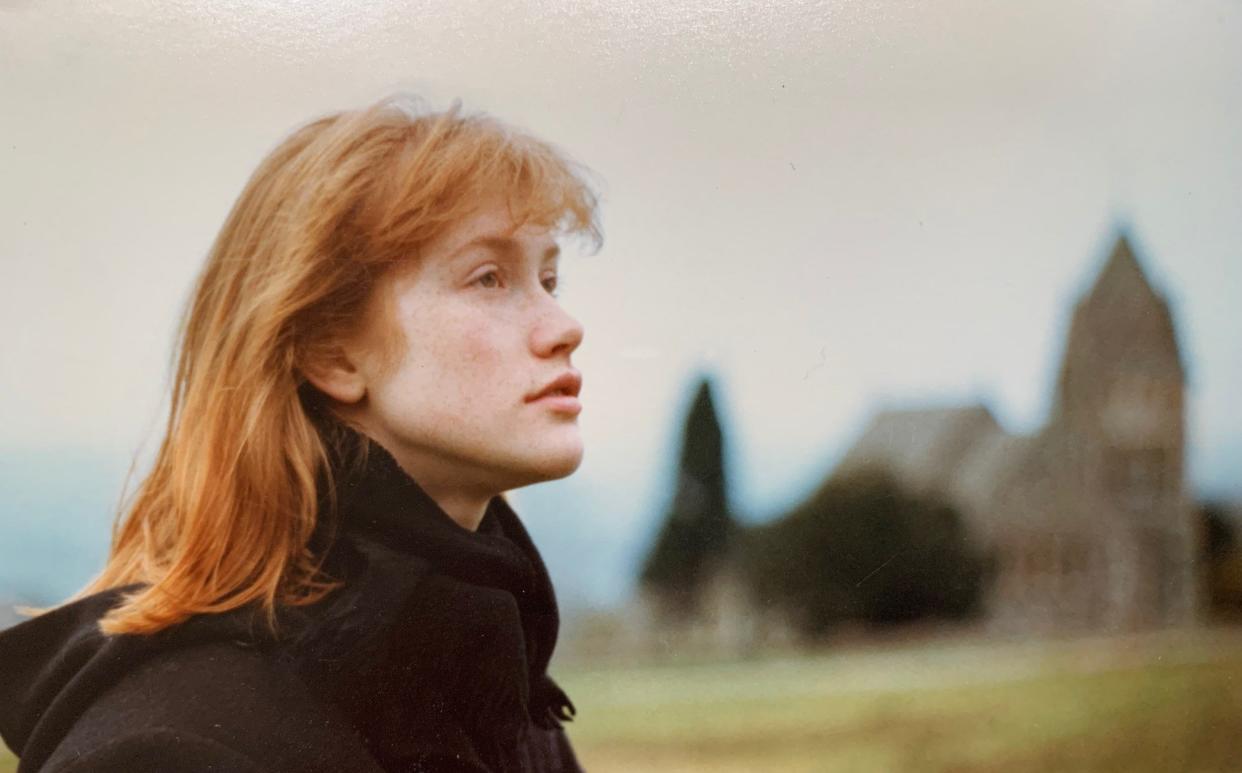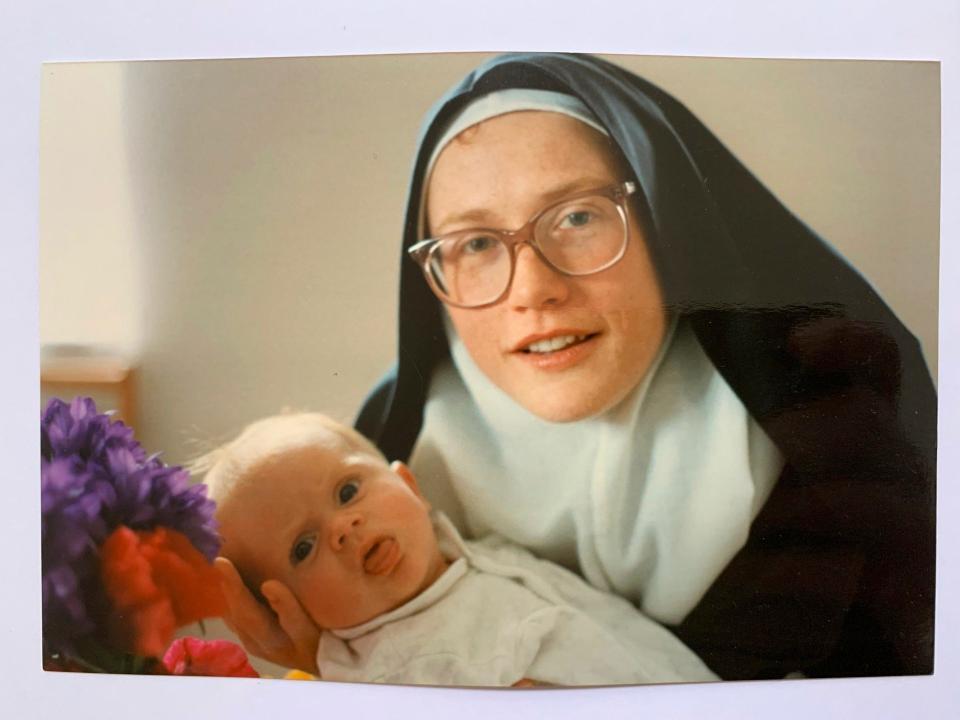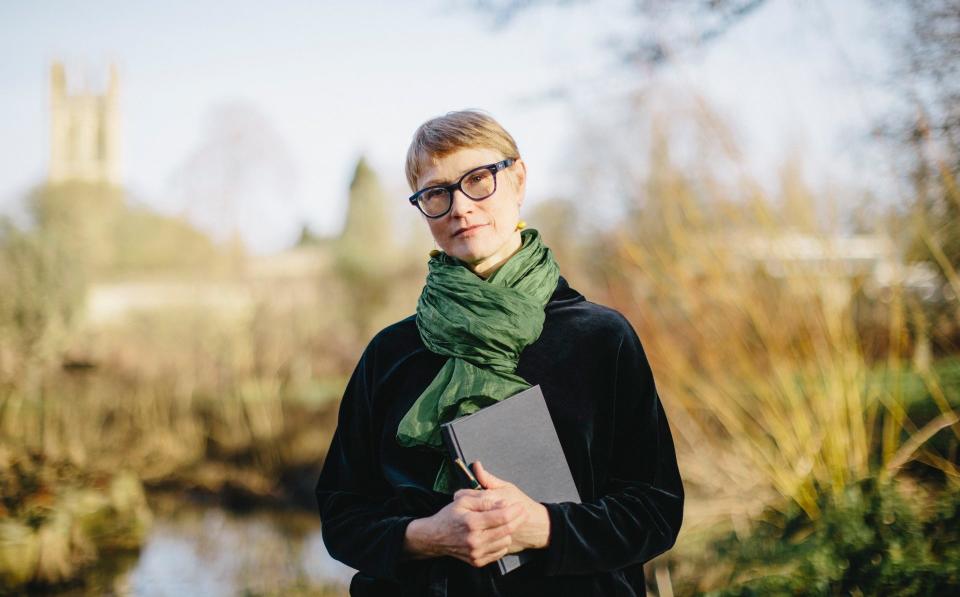The hellish abuse that led to an English nun going on the run

- Oops!Something went wrong.Please try again later.
Late in January, I attended an event to launch Rachael Allen’s new poetry collection, God Complex. Much of the conversation on stage, between Allen and Lucy Mercer, was about architectonics: the sense in which a poem might be imagined as a three-dimensional environment the poet constructs, and among whose verses the reader moves. Beyond its psychological meaning, then, Allen’s title also suggests that a “God Complex” might be a system of interrelated buildings, each somehow affiliated with divinity. Every poem in Allen’s collection forms part of that matrix.
The Carmelite house in Northumberland where Catherine Coldstream was sequestered in the 1990s, for a total of 12 years, was patently a God Complex. In Cloistered, Coldstream’s rich memoir detailing her time at Akenside Priory – a pseudonym – seven chapters are organised spatially around key locations in the Priory and grounds. There are chapters for ‘The Cell’, ‘The Infirmary’, ‘The Toolshed’; ‘The Grille’, the cross-hatched wooden bars that halve any room into which those from the outside world are permitted entry; and ‘The Choir’, with its L-shape design to ensure the sisters may not see or be seen by any visitors attending Mass, only hearing “their limping, unfamiliar voices an afterthought to our own”. When your whole world is distilled into a sealed-off plot, each room or outhouse attains the same momentous value that a person free to roam might come to feel for certain streets, cities, even countries.
Meanwhile, within the cordoned-off territory of the Priory, the other sort of God Complex rears its head with surprising regularity. “Silence and solitude allowed for a serene surface,” Coldstream writes, “but could not negate the less palatable aspects of human nature.” The second half of Cloistered veers into a far darker narrative, uncovering an underbelly of petty feuds and jealousies among the shrouded sisters, all those ordinary human neuroses and complexes they thought they could suppress.
Coldstream had arrived at Akenside in her mid-twenties, not long after her conversion. It was the death of her father William, a renowned British painter and professor of fine art at the Slade School, that ushered in belief. On witnessing his vacant body, she understood intuitively that his soul hadn’t disappeared, only migrated elsewhere. Following this revelation of an afterlife, she committed herself to placing all her trust in an ever-dependable, never-departing Holy Father. Once at Akenside, she anticipated with relief the moment at which, after three years as a novice, she would at last make her final vows, her “future sealed”, rendering her indifferent – so she hoped – to the vicissitudes of life and death beyond its walls.
The Carmelites are a Roman Catholic monastic order dating back to the 13th century, modelled on the Desert Fathers, early Christian hermits who carried out their hesychasm in the cave systems of Mount Carmel in northern Israel. Unlike the more peripatetic monastic orders, such as the Jesuits, the Carmelites are a quietist, contemplative order. Once their final vows are made, they remain enclosed in one site until their earthly deaths. Their existence becomes a so-called living death in which they swap white veils for black, and are symbolically “buried with Christ”.

Yet readers of Cloistered already know that the coffin-grave will not hold Coldstream. It opens with a prologue set several years after those vows, in which Coldstream pelts away from Akenside across the fields under the cover of darkness. For viciousness, she has found, moves like an undercurrent through the priory. During her novitiate, still in her period of grief, she’s reprimanded for being a “cry baby”, disparaged for being a bohemian Southerner, for being too interested in intellectual pursuits. One novice is kicked out because of her eating disorder, another for not being “sufficiently surrendered”.
Factions emerge, principally “the gang” whose authority quite literally brings the other women to their knees, forcing them to supplicate themselves and beg forgiveness for stepping out of line. Several of the younger sisters start to experience psychiatric problems. One novice has a fit on the chapel floor, “her head lolling, the whites of her eyes showing scarily”. Soon after, Coldstream is dragged out of bed in the infirmary and beaten by the Mother Superior. By this point, Cloistered has mutated, quite extraordinarily, into psychological horror.
In her epilogue, Coldstream – who even returned, after her triumphal flight into the outside world, to the priory for a further two years, before leaving permanently to become a mature philosophy student at Oxford University – reflects on why conditions broke down as they did at Akenside. “It is remarkable how programmable we all are as human beings,” she writes.

In that lies our ability to learn, but also our propensity to be controlled. None of us are fully our own masters and mistresses. None of us are capable of acting truly independently. We called the power that hovered over our lives, filling and directing them, ‘God’, a simple word, a sort of name, a concept that is as abstract as it is personal. You may have your own word for that unseen guest at every table in your life, that miraculous feeling that you are not quite alone.
Yet this is a strange elision of two distinct points: the first, our propensity to be manipulated by other humans; the second, the nature of a divine influence that doesn’t control us, but might assign meaning to our existence. Though Coldstream writes with brilliant, seductive detail about the darkness of Akenside, this aspect of her time as a nun – the religious, contemplative parts of her days – is underdeveloped.
In a final flourish, she entreats the reader to shut their eyes and endeavour to hear the “perfect silence” of Akenside for themselves. But where, I wondered, is the evidence for this perfect silence? When I close my eyes to imagine Akenside Priory, I don’t see God among the pews, a Paraclete through the sisters – only a young shrouded woman convulsing on the floor, and another running away from the God Complex as fast as her legs can carry her.
Cloistered by Catherine Coldstream is published by Vintage at £20. To order your copy for £16.99, call 0844 871 1514 or visit Telegraph Books

